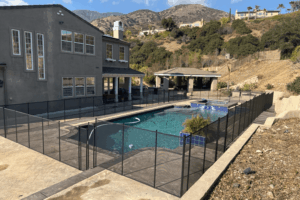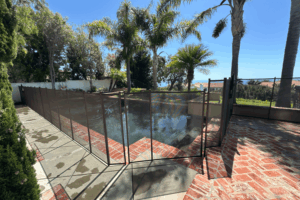
10 Questions to Ask Before Buying a Pool Safety Fence
Don’t buy a pool safety fence without asking these essential questions. This buyer’s guide helps you evaluate height, compliance, materials, installation, and more.
Home > Comparing Saltwater Pool vs. Chlorine Pool Benefits

Whether you’re building a new pool or considering a sanitizer upgrade, understanding the benefits of a saltwater pool vs. a chlorine pool helps you make the right choice for safe swimming pool water. Sanitation is a key aspect of maintaining your pool. Contaminants can enter your pool’s water from dust and debris blown in on the wind, pets and wildlife that visit or pass near it, and even on the bodies of your friends and family who enjoy your backyard oasis. Both saltwater and chlorine sanitation systems can get the job done, but one may be better for your pool’s needs than the other. We’re going to take a look at how each one works and why they may or may not be the right fit for you.
If you own a pool, you’re used to the applied chemistry task of properly conditioning and preparing your water for safe swimming. You’ll regularly balance the pH, adjust the alkalinity, and make sure the hardness is at appropriate levels. Some pool owners then need to add algaecide to control algae growth, stain inhibitors, and more, all to keep your pool looking good and the water feeling great for swimmers. Alongside those concerns, however, is sanitation, which usually sees the introduction of chemical compounds known to inhibit the growth of bacteria, aid in the deterrence of algae, and keep viruses or other pathogens in check.

While often set up as a debate about saltwater pools vs. chlorine pools, the reality is that both systems are using chlorine as a sanitizing agent. They just get there through different mechanisms.
So, if it’s all chlorine, what’s the big deal? Saltwater pools create fewer chloramines vs. chlorine pools. Chloramines happen when chlorine bonds with ammonia. These compounds are great disinfectants in their own right, but they come with a heavier chemical smell–the heavy “chlorine” smell of an overtreated pool is often actually the chloramine concentration. Aside from the smell, these compounds can be harsher on the skin and hair, more damaging to materials used in clothing and swimsuits, and they can more readily stain and damage your pool in high concentrations.
Your climate plays an important role in whether you should choose a saltwater pool vs. a chlorine pool sanitation system. Saltwater-based chlorine generation takes heat. Once the temperature drops below 60-degree Fahrenheit, chlorine production is inhibited and may stop altogether, leaving your pool unprotected. If your pool is only open during the blistering summer heat, that may be fine, but in moderate temperatures, a saltwater system may not keep up with your sanitation demands.
A major consideration for many pool owners when deliberating whether a saltwater pool or chlorine pool is better for their swimming needs is the money. Chlorine pools require the regular use of expensive chemicals that can cost you hundreds of dollars a year. While this has long been a way of life for pool owners, saltwater systems only require salt as their consumable–a common compound that is readily available at a low cost. The equipment needed to process that salt, however, can add thousands of dollars in purchase and installation fees. This makes it a less economical choice if your existing pool is chlorine-based, as it would take years of further chemical treatments to equal the cost of retrofitting your pool.
A final factor to consider if you choose a saltwater pool over a chlorine pool is that you are adding another system to an already complex recreational amenity. That’s another system to learn, clean, and maintain. For some, that’s no issue, but for others, it’s a challenge to be met head-on, but plenty of people decide it’s just too much of a burden or risk.

The final answer about which is better for you, saltwater vs. chlorine pool sanitation, is that the best one is the one that gives you the most enjoyment from your time in the water. Swimming should be fun, feel great, and offer a safe, healthy activity for the whole family. That’s why we work so hard to help our friends and neighbors create safer swimming pool areas that reduce the risk of accidental drowning.
A lack of proper barriers is cited as a contributing factor in the majority of drowning deaths. Our ASTM-compliant pool safety covers, safety nets, and removable mesh pool fencing help you prevent unauthorized access to the pool area.
Your local All-Safe installer is ready to help you. Schedule a time for a visit, and they’ll give you a free written quote on a swimming pool safety plan tailored to your pool’s protection needs. Whether you choose saltwater or chlorine pool sanitation, make safety a priority. Contact your local All-Safe Pool professional today.

Don’t buy a pool safety fence without asking these essential questions. This buyer’s guide helps you evaluate height, compliance, materials, installation, and more.

Understand how local pool fence codes work and what to check before installation. This beginner’s guide simplifies requirements so your safety barrier complies and protects effectively.

Learn the truth behind common pool safety myths and make better decisions to protect your family with fact‑based guidance on fences, barriers, and maintenance.
Enter your zip code to locate an independent installer in your area
Enter your zip code to locate an independent installer in your area

Due to the many variations in monitors, phones, and browsers, color samples and product examples may appear different on different screens. Computers and mobile devices are not all calibrated equally and color reproduction on the Internet is not precise. The same is true for printed items such as brochures and other sales literature.
In addition, the colors of our products photograph differently under different lighting conditions. For example, photos taken in full sunlight will vary from photos taken on a cloudy or overcast day. Similarly, shadows from nearby objects can affect the color and transparency of our products. If a precise color or specific shade is important, please inspect the actual color of your product prior to installation.
Many of our products’ materials are not available through typical stores and vendors and therefore must be custom manufactured specifically for our use. In order to control costs and provide you with the best value possible, our raw materials are produced in large batches and can often take several months to receive. The colors of our materials can, and often do, vary slightly from batch to batch. Although we make every effort to minimize color variations, we cannot be responsible for these differences when they occur. If a precise color or specific shade is important, please inspect the actual color of your product prior to installation.
For example, we use the name “putty” to describe some of our products. Your idea of the color “putty” may be different than someone else’s idea of “putty”. In addition, products may have the same color name but may not be the exact same color. For example, we have different shades of “black”. Please do not order using color names as your only guide. If a precise color or specific shade is important, please inspect the actual color of your product prior to installation.
If it is important that your product be an exact color or shade, it is highly recommended that you inspect the actual product prior to its installation and address any concerns with your local independent installer. Most independent installers do not offer refunds or accept returns due to color variations.